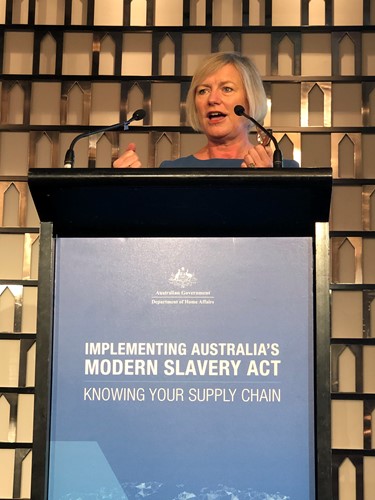
Last Friday three brothers were sentenced at Blackfriars Crown Court for a total of 28 years for keeping more than 20 slaves in a single, filthy room infested with cockroaches and rats. They had been forced to work on building sites in London for £2 a day. Judge Shetty expressed the horror of all of us: “This case involved the degradation of fellow human beings. It involved the denial of their humanity and failure to recognise that these are human beings who feel pain and misery just like all of us. That disgusts me.”
The company that was employing them had completed a modern slavery statement as required by the law. But a statement alone does not mean that there are no slaves in a supply chain. The case illustrates the importance of companies not just writing a modern slavery statement but also asking the difficult questions about how their business operates, who are they employing and who their suppliers are.
This week I made a whistle stop visit to Australia to take part in a government conference on the new legal requirement in that country for businesses to set out their actions to combat slavery in their supply chains in an annual modern slavery statement. Speakers from many international companies explained what they were doing to ensure that workers were not exploited in the fishing industry, the fashion industry, the electronics industry and in hospitality. They all argued that the moral case is strong but also the business case. Consumers are demanding higher standards and investors want to ensure that their money is not invested in countries that exploit workers and employ children.
I am determined to spend some of my time visiting victims and survivors of slavery to listen to their concerns and hopes. A few weeks ago I visited a safe house run by the Medaille Trust. The support workers were committed professionals with a real heart for the work they were doing. The safe house provided a much-appreciated home for several men, many of whom had multiple problems and would need support over the long term.
I also supported an event in Manchester hosted by the Co-op. They started a programme two years ago called ‘Bright Future’. This programme provides victims and survivors of modern slavery, who are legally allowed to work, paid work placements which can lead to permanent jobs. I met two survivors who explained how the work was playing an important part in their recovery. It is particularly important that those who have been abused through their desire to work are able to recover a sense of fulfilment through work. There are now 20 companies involved in the programme and an independent evaluation by Liverpool University has commended its effectiveness. Please do contact my office if you would like further details.
Supporting victims is a key part of my work but so is encouraging the work of law enforcement. We must relentlessly pursue and bring to justice the barbaric criminals who treat human beings as a commodity - to be bought and sold, to be exploited. I visited the National Crime Agency to get the latest briefing and met the senior investigating officers who led two recent cases: the NCA investigator who ensured that Josephine Iyamu was brought to justice for trafficking women from Nigeria to Germany where they were forced into prostitution and the Metropolitan Police investigator whose persistence led to the sentencing of Glodi Wabelua, Dean Alford and Michael Karemera for Modern Slavery Act Offences last month. Both are notable - the case of Iyamu was the first use of the Modern Slavery Act for offences outside this country although committed by a British citizen. The second case was where Modern Slavery Act offences were used to convict County Lines drug dealers who were using children and very vulnerable people to traffick drugs. The use of this legislation sends the strongest signal that using children to carry and sell drugs is particularly heinous and will attract the most severe penalties.
Sometimes I am daunted by the scale of the challenge to eradicate modern slavery however I was reminded yesterday that Martin Luther King Jr. said that: "the arc of the moral universe is long, but it bends towards justice".
